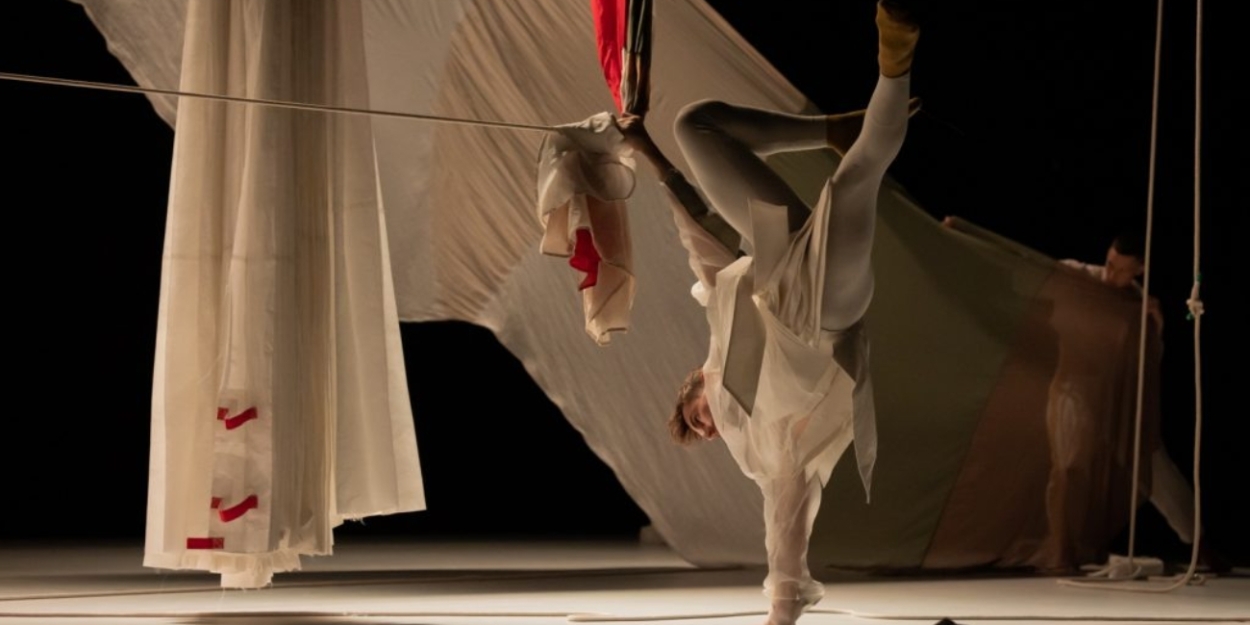Review: ASCENT at Dunstan Playhouse, Adelaide Festival Centre
Sydney Dance Company's 50th anniversary

Reviewed by Ray Smith, Thursday 11th May 2023.
The Sydney Dance Company presents Ascent, as part of their 50th-anniversary celebrations.
There was a slight problem at the Adelaide Festival Centre box office when I went to pick up my tickets for ASCENT, a triple header performance by the Sydney Dance Company, featuring the reprise of Antony Hamilton's Helpmann Award-winning Forever & Ever, and world premieres by renowned international choreographers Marina Mascarell, and Rafael Bonachela, to be staged in the capacious Dunstan Playhouse. They could not find my tickets. I was not alone in my dilemma, though, as they could not find Programming Executive for the Adelaide Festival Centre, Callan Fleming's tickets either. The helpful and friendly staff soon rectified the situation though. Thanks, Taylah.
The first piece to be offered was Artistic Director, Rafaeal Bonachela's, I Am-ness, and featured the work of the Latvian composer Pńďteris Vasks, in a musical work entitled Lonely Angel, which Bonachela described as a meditation for violin and strings.
There were four dancers on the vast and empty stage, which they filled with classical style exaggerated gestures, and impossible leaps, as the music plodded its way through a pastorale that would have left both shepherd and flock heading for the nearest barn to escape its dated and utterly clichéd meanderings. While the dancers were superb in their control and athleticism, they looked like they were on a football field, and the choreography and the score were unchallenging, safe, and rather dull. The audience loved it.
The second piece was preceded by a monologue from Bonachela, standing before the closed curtain, as he described the work we had just seen and the format and the works that would follow, in order to give the stage crew behind the curtain time to set up the stage for the next performance.
The curtain finally rose and Marina Mascarell's The Shell, A Ghost, The Host, and The Lyrebird began. The once empty stage was now still vast, and all but empty, but had a number of ropes descending from the stage ceiling that were attached to pulleys and connected to large, amorphous sheets of cloth that the dancers could manipulate by tugging on the ropes, which they did, vigorously, like demented campanologists.
I anticipated complex maypole-like interweaving of the ropes, pulling the cloth sheets into shifting forms in a carefully choreographed routine of mathematical precision but, in reality, it appeared to be confused, random, and clumsy.
Dancers tripped over the ropes and struggled with the sandbags that counterbalanced the weight of the cloth, which tangled in ungainly masses like the torn sails of a ship hopelessly out of control on a stormy sea, all the while making more classical ballet-like exaggerated gestures for reasons only known to the choreographer. It seemed clumsy, awkward, dull, indulgent, and utterly pointless just like the score that accompanied it. The audience loved it.
There was a short interval.
I was the first person to reach the bar and was, therefore, able to secure a seat in the foyer in which I slumped disconsolately, wishing ruefully that the very helpful Taylah at the box office had failed in her mission to find my tickets.
The third and final offering for the evening was Antony Hamilton's 2018 work, Forever and Ever, with a score by Julian Hamilton, of the 80's inspired techno duo, The Presets. It began in silence with a solo dancer, Jesse Scales, occupying the enormous and, again, all but empty stage.
Scales is an enormous force, and totally filled the silent stage with a punk rock arrogance and disdain, performing robotic movements with extreme precision, ending each of their individual solo pieces with a disinterested shrug and almost contemptuous glance at the audience before casually strolling off to begin another, their ownership of the space absolutely beyond question.
According to their biography: "Born in Hobart, Jesse is from Adelaide, where they trained with Terry Simpson and was awarded their RAD Solo Seal. They received full scholarships to study with Complexions Contemporary Ballet in New York and Nederlands Dans Theatre in The Hague and went on to major in classical ballet at the New Zealand School of Dance.
Since joining Sydney Dance Company in 2012, Jesse performed a feature role in the Australian premiere of William Forsythe's Quintett for which they were awarded the 2015 Green Room Award for 'Best Female Dancer' and a nomination for the 2015 Helpmann Award for 'Best Female Dancer'. Jesse made their choreographic debut in Sydney Dance Company's 2016 New Breed season. In 2017 Jesse was named Most Outstanding Dancer in the Dance Australia Critics' Choice Survey."
This was, for me, the highlight of the entire evening, and, while the audience chuckled at what some might perceive to be a comedic interlude, I was struck by Scales's absolute control and deliberate manipulation of space with impeccable timing. It was faultless.
Julian Hamilton's score began with a simple dotted 4/4 rhythm pounded out with a synthesised drum sound, and it simply went on and on, as hooded figures shuffled onto the stage, reminiscent of Karlheinz Stockhausen's 1981 opera, Samstag aus Licht (Saturday from Light), but without the musical intricacy and integrity. Though Scales may be one in a million in terms of talent and concentration, there were fifteen other highly skilled and extensively trained dancers on the stage, but the whole thing seemed dated, safe, conservative, and rather ordinary.
Some of the choreography reminded me of Meryl Tankard's six-year stewardship of the Australian Dance Theatre, a period that I am still trying to forget, and the soundtrack was monotonous to the point of downright irritating. Although this particular work made better use of the simple props, and was much more visually interesting than the works that had preceded it, I was totally underwhelmed by the entire show. The audience loved it.
Reader Reviews

Videos
